Photographs: Parth Sanyal/Reuters BS Reporter in Mumbai
The empowered group of ministers on fuel pricing is to meet this week to take a view on the price of diesel.
Renewed fears about inflation, triggered by the spike in vegetable prices, may exert pressure on the government and force it to delay a decision.
Of all the sources of fuel, diesel has the highest weight, of 4.6702 per cent, in the wholesale price index, which works as India's headline rate of inflation.
Petrol comes second with a WPI weight of 1.09015 per cent, followed by LPG with a weight of 0.91468 per cent and kerosene with 0.73619 per cent weight.
. . .
Many good reasons why diesel price must be hiked
Image: Gudia, an oil scavenger, collects engine oil at an auto workshop in Jammu.Photographs: Amit Gupta/Reuters
These weights are dated and would need changing, but there is no doubt that diesel still constitutes an important source of fuel for the economy with an exaggerated potential to impact inflation, given the pass through potential of diesel users in the transport sector.
It is a measure of the mood of cynicism today that most observers do not, in fact, expect a decision to come out of the meeting of the eGoM.
That would be a pity.
There are several reasons why the government must act sooner rather than later in taking the tough call on diesel pricing.
. . .
Many good reasons why diesel price must be hiked
First, the underpricing of diesel has encouraged inefficient consumption of an imported source of energy.
While the older problem of diesel vehicles being a source of greater pollution than petrol-fuelled vehicles is no longer necessarily true, given the availability of good-quality diesel, the fact is that the even lower cost of kerosene has encouraged adulteration of diesel as well as petrol, adding to the problem of pollution.
Subsidised diesel has become a major polluter in urban and rural India.
Economic pricing of the product can have a salutary impact on consumption and, therefore, a positive impact on pollution levels.
. . .
Many good reasons why diesel price must be hiked
Image: An employee fills petrol at a pump in Kolkata.Photographs: Jayanta Shaw/Reuters
Second, subsidised diesel has destroyed the bottom line of oil marketing companies, thereby hurting the legitimate interests of their shareholders, and added to the government's rising and high budgetary deficit.
It is estimated that public sector oil marketing companies lose an average of Rs 6.08 per litre on diesel, Rs 17.72 a litre on kerosene and Rs 272.19 per 14.2-kg LPG cylinder.
These companies are expected to bear a loss of a whopping Rs 68,000 crore (Rs 680 billion) this year if government policy is not changed.
. . .
Many good reasons why diesel price must be hiked
Photographs: Reuters
The pressure to increase diesel prices arises also out of the fact that globally energy prices, especially oil prices, are once again rising.
Already at $90 per barrel, crude oil is expected to sell once again in the triple digits in the not-too-distant future.
The ministry of petroleum and natural gas has for a long time now tried to please all on petroleum pricing and has, in the process, messed up the oil economy in India.
The government's recent tough decision to allow market forces to determine petrol prices was a brave and a good one.
. . .
Many good reasons why diesel price must be hiked
Image: School children watch a train transporting petrol in Jammu.Photographs: Amit Gupta/Reuters
It should extend the logic of its thinking on petrol prices to diesel prices as well, for all the reasons we have mentioned.
Without a correction on diesel, LPG and kerosene prices, the government's fiscal management programme will be adversely affected.
Worse, the persistent problem of inefficient use of scarce energy resources and the problem of air pollution, caused by the adulteration of petrol and diesel with kerosene, and the adulteration of petrol with diesel, will continue unabated.

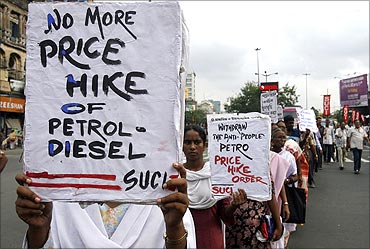
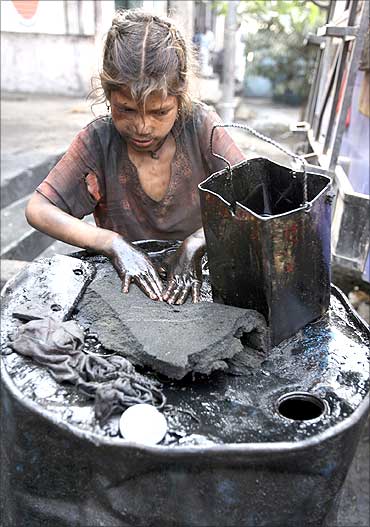
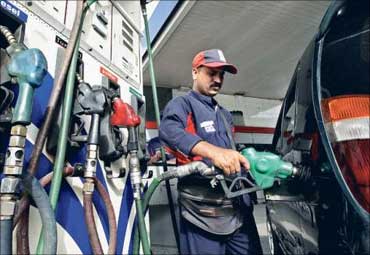
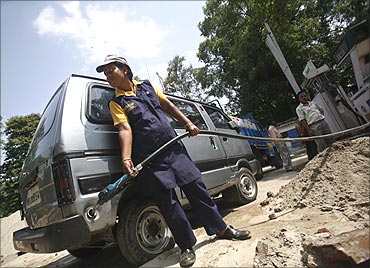
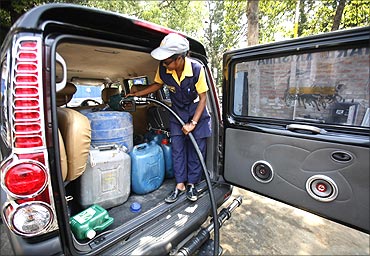
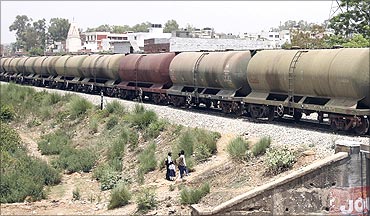

article